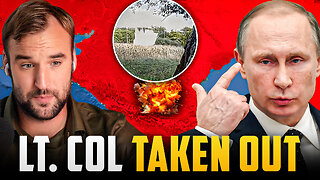Premium Only Content

Locals dying from RSV, Respiratory Syncytial Virus Infection , inflammation of the small airways
Locals dying from , RSV, Respiratory Syncytial Virus Infection , inflammation of the small airways
Respiratory Syncytial Virus (RSV) is a common viral infection that affects the respiratory system, particularly the lungs and airways. It is highly contagious and can be spread through direct contact with an infected person, touching contaminated surfaces, and through respiratory secretions, such as saliva or mucus.
RSV is a major cause of respiratory illness in infants and young children, and it can also cause severe respiratory illness in older adults and people with weakened immune systems. In fact, RSV is the leading cause of hospitalization among infants in the United States, and it is estimated that almost all children will be infected with RSV at least once by the age of 2.
RSV infection typically begins with symptoms similar to those of a cold, such as a runny nose, cough, and fever. These symptoms usually appear within 4-6 days after exposure to the virus. In some cases, RSV can cause more severe respiratory symptoms, such as difficulty breathing, wheezing, and rapid breathing. These symptoms can be especially dangerous for young children and older adults, who may require hospitalization and other medical interventions.
In addition to respiratory symptoms, RSV can also cause other symptoms, such as ear infections and conjunctivitis (pink eye). These symptoms are more common in infants and young children.
RSV is diagnosed through a variety of tests, including nasal swabs, throat swabs, and blood tests. Treatment for RSV is primarily supportive and involves managing symptoms, such as fever and cough, with over-the-counter medications. In some cases, antiviral medications may be used to treat severe RSV infections, particularly in infants and young children.
Preventing the spread of RSV is important, particularly among young children and other high-risk populations. This can be done by washing hands frequently, avoiding contact with people who are sick, and avoiding close contact with infants and young children when you are sick. There is also a vaccine available for certain high-risk populations, such as premature infants and children with certain underlying medical conditions.
In conclusion, Respiratory Syncytial Virus (RSV) is a common viral infection that affects the respiratory system and can cause severe respiratory illness, particularly in infants and young children. It is highly contagious and can be spread through direct contact with an infected person or contaminated surfaces. Treatment for RSV is primarily supportive, and prevention is key to controlling the spread of the virus.
-
 13:51
13:51
Mike Martins Channel
8 days ago $0.05 earnedEast Indian Man Born and Raised in Canada is Frustrated
140 -
 1:20:12
1:20:12
Russell Brand
4 hours agoFrank Turek on Charlie Kirk, Faith & Today’s Battle for Truth - SF643
80.4K35 -
 LIVE
LIVE
Jeff Ahern
51 minutes agoNever Woke Wednesday with Jeff Ahern
104 watching -
 32:22
32:22
ArturRehi
2 hours agoDrone Wall, Blackouts, Assassinations — Russia Under Pressure
11 -
 1:59:29
1:59:29
The Charlie Kirk Show
3 hours agoShut It Down + End the ADL + The Baddest Bunny | Tim Pool | 10.1.2025
171K87 -
 57:39
57:39
Dear America
2 hours agoThe Government Is Closed And Netflix Wants Your Kids! + Revival Happens If We Keep Moving Forward
44.5K39 -

The White House
4 hours agoPress Secretary Karoline Leavitt Briefs Members of the Media, Oct. 1, 2025
17.5K13 -
 53:14
53:14
The Kevin Trudeau Show Limitless
5 hours agoKevin Trudeau Reveals the Crypto Secrets Only the Ultra-Rich Know
4.9K8 -
 3:36
3:36
Michael Heaver
5 hours agoItaly Witnesses POWERFUL Election Victory
5.14K3 -
 12:51
12:51
Silver Dragons
17 hours agoIs Silver a Good Buy at an ALL TIME HIGH?
4.5K